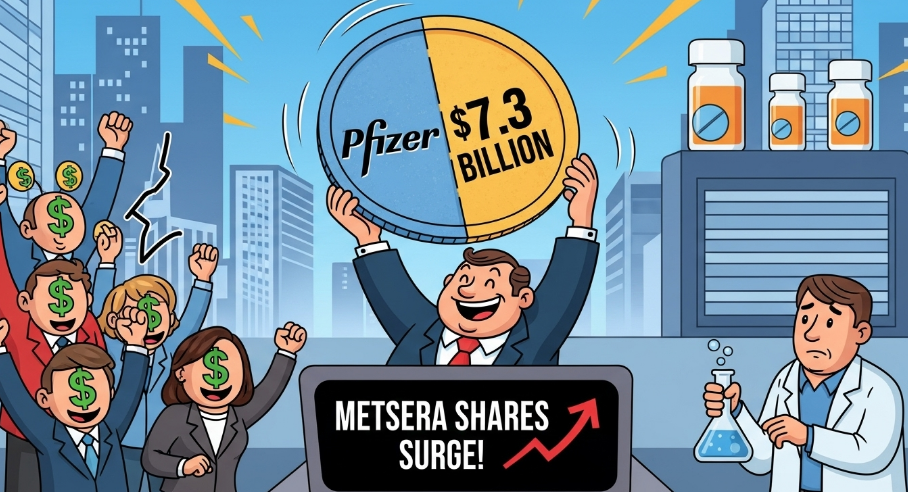Here’s the bottom line: Pfizer just placed a massive bet on your future weight-loss options, and it could completely change how you think about obesity treatment.
Let me tell you what just happened – and why it matters to you personally.
Pfizer Just Made the Biggest Move in Weight Loss Since Ozempic
On Monday, September 22, 2025, Pfizer announced they’re buying Metsera for up to $7.3 billion – that’s $47.50 per share in cash, plus potentially another $22.50 per share if certain milestones are hit. This isn’t just another corporate acquisition. This is Pfizer admitting they desperately want back into the weight-loss game after their previous attempts crashed and burned.
Here’s what you need to understand: This deal could give you access to weight-loss treatments that are more convenient, more effective, and potentially cheaper than what’s available today.
Why This Matters More Than You Think
Right now, you’re probably familiar with Ozempic or Wegovy – those weekly injections that have dominated headlines. But here’s the problem: Eli Lilly has been crushing Novo Nordisk in the weight-loss market, capturing 57% market share by the second quarter of 2025, while the global obesity drug market is projected to reach $150 billion by the early 2030s.
What does this mean for you? More competition equals better options and potentially lower prices. And Pfizer’s new acquisition brings some game-changing possibilities to the table.
What Metsera Brings to Your Medicine Cabinet
Here’s where it gets exciting for you as a potential patient:
Monthly Injections Instead of Weekly
Metsera’s lead drug candidate, MET-097i, is designed as a potential once-monthly injectable, meaning you’d only need to take it 12 times per year instead of 52 times. Think about it – that’s one injection per month versus one injection every week. Less hassle, fewer doctor visits, and more convenience in your life.
Potentially Superior Weight Loss
MET-097i showed an average weight loss of 11.3% in patients during mid-stage trials. While that might not sound revolutionary compared to existing treatments, remember this is just the beginning. Metsera is also developing MET-233i, an amylin agonist that executives believe has “best-in-class potential.”
Pills on the Horizon
Here’s what could be a real game-changer for you: Metsera has oral GLP-1 and amylin drug candidates in preclinical development. Imagine taking a daily pill instead of giving yourself injections. No needles, no refrigeration requirements, no injection site reactions.
Why Pfizer Failed Before (And Why This Time Could Be Different)
Let’s be honest about Pfizer’s track record. The company had scrapped the development of danuglipron in April after a trial patient experienced potential drug-induced liver injury. It had also discontinued the development of a twice-daily version in late 2023 due to various side effects.
But here’s why this acquisition is different: Instead of trying to develop everything from scratch, Pfizer is buying proven science. Metsera’s drugs use proprietary technology that gives molecules a longer half-life to support longer dosing intervals. This isn’t Pfizer gambling on unproven concepts – they’re buying a company that’s already demonstrated results.
What This Could Mean for Your Wallet
Here’s the financial reality you need to understand: The current GLP-1 weight-loss drug market is projected to grow at 18.54% annually and reach $48.84 billion by 2030. With that kind of growth, and new entrants expected to cause annual pricing declines to accelerate toward 10%-15% as competitors work to gain insurance coverage, you could see more affordable options in the coming years.
The value proposition for you: More companies competing means insurers have more leverage to negotiate better prices, and manufacturers have incentives to offer competitive pricing to gain market share.
Timeline: When You Might Actually Access These Treatments
Don’t expect to walk into your doctor’s office next month asking for Metsera’s drugs. Preliminary results for weekly and monthly dosing are expected in 2026, according to a Pfizer investor presentation. The deal is expected to close in the fourth quarter of 2025.
Realistic timeline for you:
- 2026: Phase 2 results published
- 2027-2028: Phase 3 trials likely begin
- 2029-2030: Potential FDA approval (if everything goes well)
The Bigger Picture: Your Weight-Loss Options Are About to Explode
This Pfizer deal is just the beginning. Analysts expect 16 new obesity drugs could launch by 2029, with roughly $70 billion of the GLP-1 market coming from these challengers by 2031. We’re not just talking about Pfizer – potential launches from new challengers could start in 2026 with Boehringer Ingelberg and Zealand’s survodutide, with several launches in 2027 (Amgen, Altimmune), 2028 (Pfizer, Roche, Viking, and Structure), and 2029 (Roche, Viking, AstraZeneca, and Zealand).
What this means for you: In the next 5-7 years, you’ll likely have access to weight-loss treatments that are more effective, more convenient, and more affordable than anything available today.
Should You Wait or Act Now?
Here’s my advice: Don’t put your health on hold waiting for future treatments. The current options like Wegovy and Zepbound are already highly effective for many people. But if you’re struggling with cost, side effects, or access issues with current treatments, knowing that better options are coming can give you hope and help you make informed decisions with your healthcare provider.
The bottom line: Pfizer’s $7.3 billion bet on Metsera signals that the pharmaceutical industry believes the weight-loss market is about to get much more competitive and innovative. For you, that means better treatments are coming – and that’s something worth getting excited about.
Want to stay informed about breakthrough weight-loss treatments? The landscape is changing rapidly, and new developments could directly impact your treatment options and costs.








